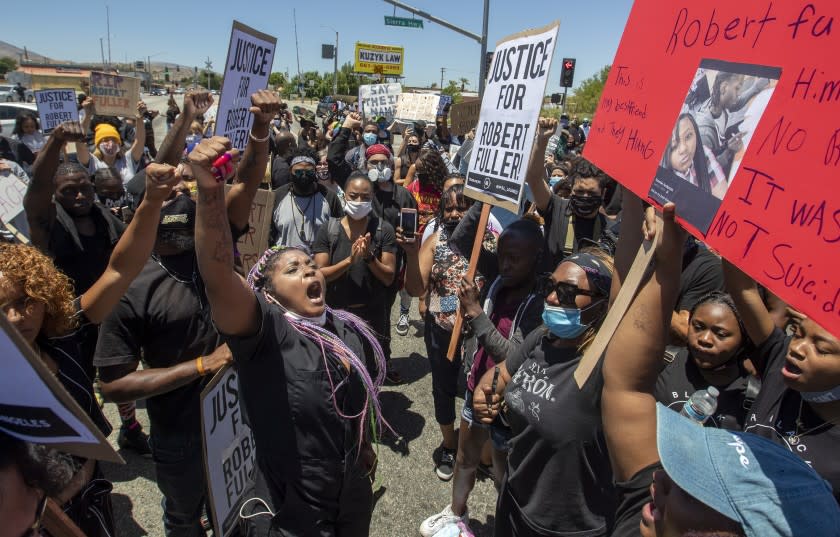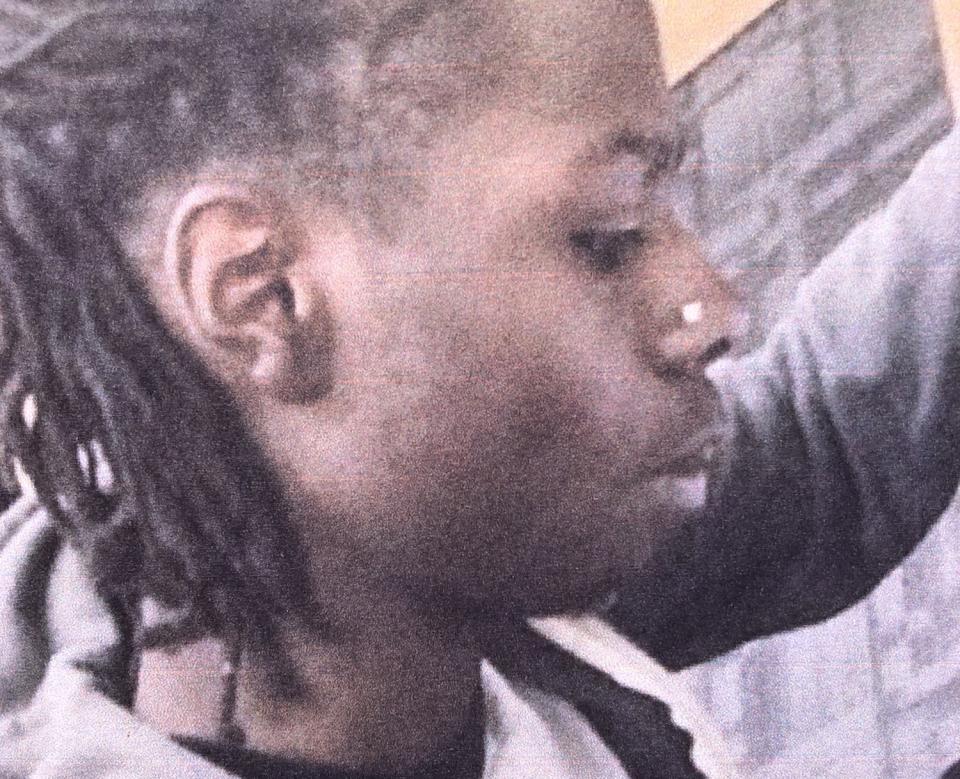Supervisor asks attorney general to review death of Black man found hanging in Palmdale

Los Angeles County Supervisor Kathryn Barger on Saturday formally requested that California's attorney general conduct an independent investigation into the death of a young Black man who was found this week hanging from a tree near Palmdale City Hall.
Atty. Gen. Xavier Becerra "will lend additional expertise and oversight into this important investigation and provide the community with the answers they deserve," Barger said in a statement. "It is my hope that our collective efforts will help to support those struggling and grieving surrounding the circumstances of this tragedy."
Thousands of protesters gathered in Palmdale on Saturday to mourn 24-year-old Robert Fuller, whose death has sparked alarm in the Antelope Valley as investigators try to determine whether it was a suicide or if foul play was involved.
Authorities initially said they suspected it was a suicide, but then backed off that statement and ordered an autopsy. His body was found hanging from a tree near City Hall early Wednesday.
Many of the people at Saturday’s memorial expressed anger and frustration at Fuller’s death and what they see as a rush by authorities to label it a suicide. On Friday, Lt. Kelly Yagerlener of the Los Angeles County medical examiner-coroner’s office said a decision on the cause of Fuller's death has been deferred pending an investigation. A full autopsy is planned.
“They suspect suicide?” one woman in the crowd said Saturday. “How can they say that? I can say I suspect a lynching.”
“I believe the family deserves the benefit of the doubt. Not the coroner’s office,” said one man, who said he planned to ask the district attorney to investigate the death.
Diamond Alexander, Fuller’s sister, addressed the growing multiethnic crowd in the courtyard behind Palmdale's City Hall.

“We want to find out the truth on what really happened,” Alexander said. “Everything they told us is not right. We just want the truth. My brother was not suicidal. He was a survivor. He was street smart.”
Another speaker, Pharaoh Mitchell, called on the small green space to be renamed Robert Fuller Memorial Park.
Activist Najee Ali then led the crowd, which by noon had swelled to about 2,000, on a half-mile march down the center of Sierra Highway to the Palmdale Sheriff's Station, where he first took a knee for a moment of silence before pounding on the glass doors of the building, demanding to speak with an officer.
A dozen deputies in riot helmets stood tightly bunched on the other side of the tinted glass as a Sheriff's Department helicopter circled overhead. After half an hour, Lt. Derrick Ballentine, the watch commander, came out a side door to address the crowd and take questions.
Fuller's death is still being investigated by homicide detectives, Ballentine said, adding that he had no updates. The lieutenant said he, personally, would have no problem with an independent probe, which Ali intends to call for on Monday.
But Ballentine said that was not his call. After he spoke, the marchers returned to City Hall in a peaceful march.
Fuller’s death has generated intense attention, especially after weeks of protests over the police killing of George Floyd in Minneapolis. Kim Kardashian West tweeted about the case, urging people to sign a petition demanding a full investigation.
Community members confronted city officials at a news briefing Friday, questioning why they were quick to label Fuller’s death a suicide and asking whether he might have been a homicide victim.
The residents asked whether there were cameras around the park. The city said there were no outdoor cameras, and video recorders on a nearby traffic signal could not have captured what happened.
Some community members detailed examples of racism in the high desert city, including Confederate flags, and said officials should not be quick to dismiss it as playing a role in Fuller’s death.
"We have a history with nooses. We don’t like ropes around our necks," said one man. "It was a message for the protest we had in Palmdale and Lancaster."
City Manager J.J. Murphy acknowledged, "Maybe we should have said it was 'an alleged suicide.'" Then he added: "Can I also ask that we stop talking about lynchings?"
The audience erupted with cries of “Hell no!”
"I have doubts about what happened," said Marisela Barajas, who lives in Palmdale. After the news conference, Barajas walked over and joined a crowd gathering at the tree where Fuller's body was found. An American flag flew nearby.
"All alone, in front of the City Hall — it’s more like a statement," she said. "Even if it was a suicide, that in itself is kind of a statement."
Palmdale officials said they support an independent investigation of the case.
"The city of Palmdale is joining the family [of Robert Fuller] and the community's call for justice, and we do support a full investigation into his death," Palmdale Public Information Officer John Mlynar said. We will settle for nothing less than a thorough accounting of this matter."
The Antelope Valley has a substantial Black population. There have been repeated allegations of racist policies, including a U.S. Justice Department finding that officials worked to drive Black people out of public housing.
Five years ago, the Los Angeles County Housing Authority agreed to pay $2 million to victims of alleged discrimination, and some families who lost their housing assistance will have the chance to get it back.
At the same time, the Sheriff’s Department agreed to pay $700,000 and implement policies aimed at preventing racial bias. The Justice Department launched an investigation in 2011 into allegations that people of color — particularly Black people — living in federally subsidized housing in Lancaster and Palmdale were being harassed and discriminated against by sheriff’s deputies and county housing agency officials.
More recently, allegation of racism roiled a local school district.
On Saturday, several marches were scheduled throughout Los Angeles County to decry police brutality in the wake of Floyd's death.
More than a hundred congregants and friends of the Cochran Avenue Baptist Church marched through Mid-Wilshire protesting the treatment of Black people across the country.
At one point, Pastor Charles Johnson asked the marchers to take a knee. He then led them in prayer.
"We pray for a public witness to all the injustice that’s in our community," he said.
The marchers headed along San Vicente Boulevard winding through residential streets with a stop in a neighborhood known as Little Ethiopia. They were heading to the La Brea Tar Pits.
Antoinette Jordan, 50, marched alongside her boyfriend, Quinn. Jordan attends the church and said it was her third protest march.
Throughout these protests she’s been thinking of her adult sons who are medical caregivers. The last few months have been hard for them.
“You got COVID you gotta worry about, and then you gotta worry about being a Black man," she said.
These demonstrations "help give people a voice," she said, "I learned: The louder you sing, the more audible you are, the better your message comes across."
Outside the largest jail in Los Angeles County, doctors and medical workers donned their white jackets and took to the streets in downtown on Saturday to protest the treatment of black people across America. They drew a direct connection between the racial inequities in healthcare with the danger Black people face in jails and on the street.
Chants of "care, not cages" and "defund the sheriff" rang through the air as two dozen sheriff’s deputies looked on.
“We coming for your budget!" one speaker yelled. "We coming for your pensions!”
In the crowd, medical workers spoke about how they have been held up as heroes during the coronavirus pandemic. It lead many of them to believe that they should use their platform to speak up about how deadly mass incarceration has been to communities of color.
Sapan Thakur, a physical therapist in Pomona, wore a shirt with former NFL quarterback Colin Kaepernick emblazoned on the front under his white jacket. He said the last several weeks have been an awakening for him about the importance of speaking up.
"I was on the sidelines. I was paying attention, but being silent makes you complicit," he said. "If I can come out on a day off, it’s something."
Some protesters spoke about how challenging it was for their patients to get satisfactory healthcare and felt that more money should be devoted to programs that house people, educated them and keeps them healthy.
"We’re not just here to do no harm, but to stop harm where it’s happening," said demonstrator Mark-Anthony Clayton-Johnson.
City News Service contributed to this report.

